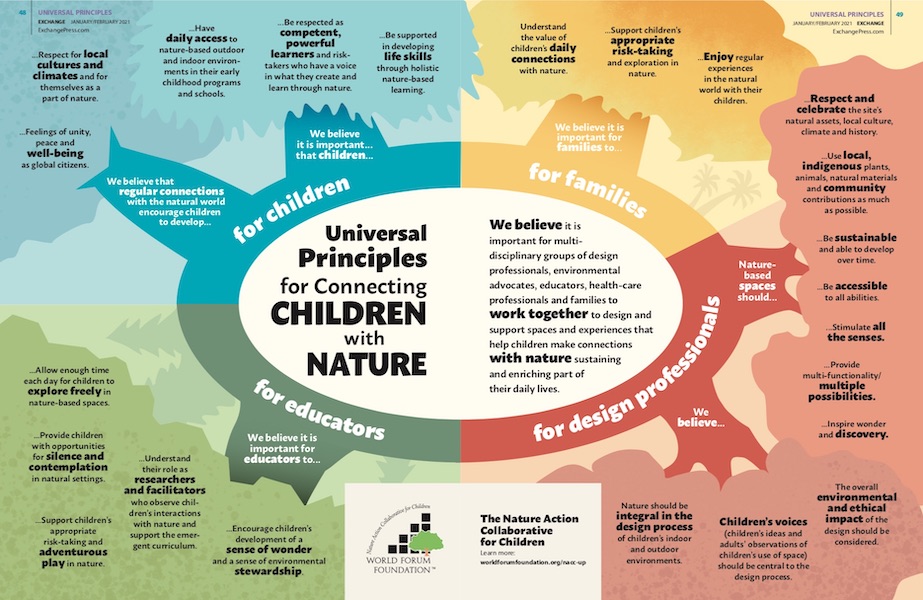These universal principles for children, for design professionals, for educators and for families were developed by the Nature Action Collaborative for Children, a World Forum Foundation Working Group.
Download the Universal Principles in the following languages:
Graphic Versions: English 1-page Graphic | English 2-page Graphic
Text Versions: English text | Arabic text | Español/Spanish text
See these principles in action in Wonder, the newsletter of the Nature Action Collaborative for Children, published six times per year.
For Children
We believe it is important for multi-disciplinary groups of design professionals, environmental advocates, educators, health-care professionals and families to work together to design and support spaces and experiences that help children make connections with nature a sustaining and enriching part of their daily lives.
We believe that regular connections with the natural world encourage children to develop:
- Respect for local cultures and climates and for themselves as a part of nature.
- Feelings of unity, peace and well-being as global citizens.
We believe it is important that children:
- Have daily access to nature-based outdoor and indoor environments in their early childhood programs and schools.
- Be respected as competent, powerful learners and risk-takers who have a voice in what they create and learn through nature.
- Be supported in developing life skills through holistic nature-based learning.
For Design Professionals
We believe:
- Nature should be integral in the design process of children’s indoor and outdoor environments.
- Children’s voices (children’s ideas and adults’ observations of children’s use of space) should be central to the design process.
- The over-all environmental and ethical impact of the design should be considered.
Nature-based spaces should:
- Respect and celebrate the site’s natural assets, local culture, climate and history.
- Use local, indigenous plants, animals, natural materials and community contributions as much as possible.
- Provide multi-functionality/multiple possibilities.
- Stimulate all the senses.
- Be accessible to all abilities.
- Inspire wonder and discovery.
- Be sustainable and able to develop over time.
For Educators
We believe it is important for educators to:
- Allow enough time each day for children to explore freely in nature-based spaces.
- Understand their role as researchers and facilitators who observe children’s interactions with nature and support the emergent curriculum.
- Support children’s appropriate risk-taking and adventurous play in nature.
- Provide children with opportunities for silence and contemplation in natural settings.
- Encourage children’s development of a sense of wonder and a sense of environmental stewardship.
For Families
We believe it is important for families to:
- Understand the value of children’s daily connections with nature.
- Support children’s appropriate risk-taking and exploration in nature.
- Enjoy regular experiences in the natural world with their children.



